Disadvantages Of Zinc Roofing And Common Problems – Is It Worth Buying?
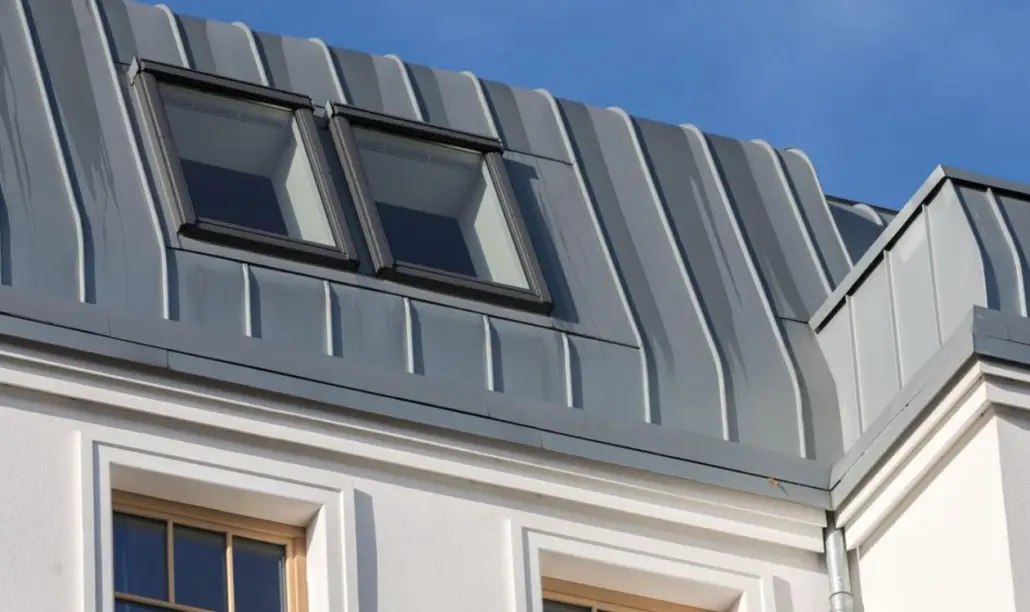
When deciding on which material to use for their roof, each homeowner will have a unique combination of the most important factors.
Zinc’s characteristics tend to fulfil a number of these necessary qualifiers. Its longevity, malleability and light weight are among its most favourable features.
That said, it is important to also be aware of the disadvantages of zinc roofing before making your final pick on what material you want for your roof.
This article aims to lay these disadvantages out for you in order to help you make an informed decision. Gary Whillock gives an excellent overview of the attributes and intricacies of zinc roofing in this video.
Disadvantages Of Zinc Roofing
Cost
Even though, according to Simon Norton of the International Zinc Association Africa Desk, zinc is one of the most abundant metals on earth, as far as roofing material goes it still tends to be one of the most expensive options available.
That said, after the initial high installation cost, zinc roofs are likely to cost you less in maintenance and repairs over a longer period of time.
So it’s important for you to consider your personal situation to determine whether you need a roofing option that is more affordable in the short term, or more durable over a long time.
Noise
The second, somewhat obvious, disadvantage of zinc roofing is that it can be quite noisy. You can imagine the sound of raindrops crashing onto, or branches scraping against zinc on a stormy day.
Again, this story has two sides. Gentle rain on a zinc roof can create an amazing, relaxing ambience. There are also methods for reducing the noise in homes with zinc roofing, as laid out in this article by Timberblogger.
Unpredictable patination
Patinatination is a naturally occurring phenomenon that occurs when certain metals are exposed to specific chemicals.
Homeowners want their roofs to patinate because the thin layer has both aesthetic and protective value. Zinch, however, does not patinate as easily as some alternative materials.
While this is a disadvantage of zinc roofing, patination is by no means an essential element of roofing, and if you are set on having a patinated zinc roof, there are methods of inducing patination manually as explained in this video by Sculpt Nouveau.
Light in weight
Though being thin and malleable is one of the main attractions of zinc roofing, being so light in weight also makes it more susceptible to being ripped off by abnormally strong wind or dented by falling branches.
A well-installed zinc roof should be reasonably secure, but sturdier materials like wood or tiles won’t be affected by wind as easily.
Installation issues
It’s essential to ensure that you have your zinc roof installed by a specialist. Faulty installation will lead to consequences that completely overshadow any of the benefits of zinc roofing.
A zinc roof that is not installed properly will not sufficiently keep wind and water from entering your home during storms. Apart from leaks, a roof that was not installed properly will not be able to contain the heat in your house.
Most problems associated with zinc roofs are caused by faulty installation, this is something you can prevent by making sure that you hire someone who is knowledgeable about zinc roofing.
Regulation issues
As with any roofing material, it is important to note that there are strict regulations regarding zinc roofs that need to be considered.
These will differ from country to country and state to state, so it is important to speak to your contractor and ensure that everyone is aware of and compliant with the regulations of your area.
Common Problems & Dangers
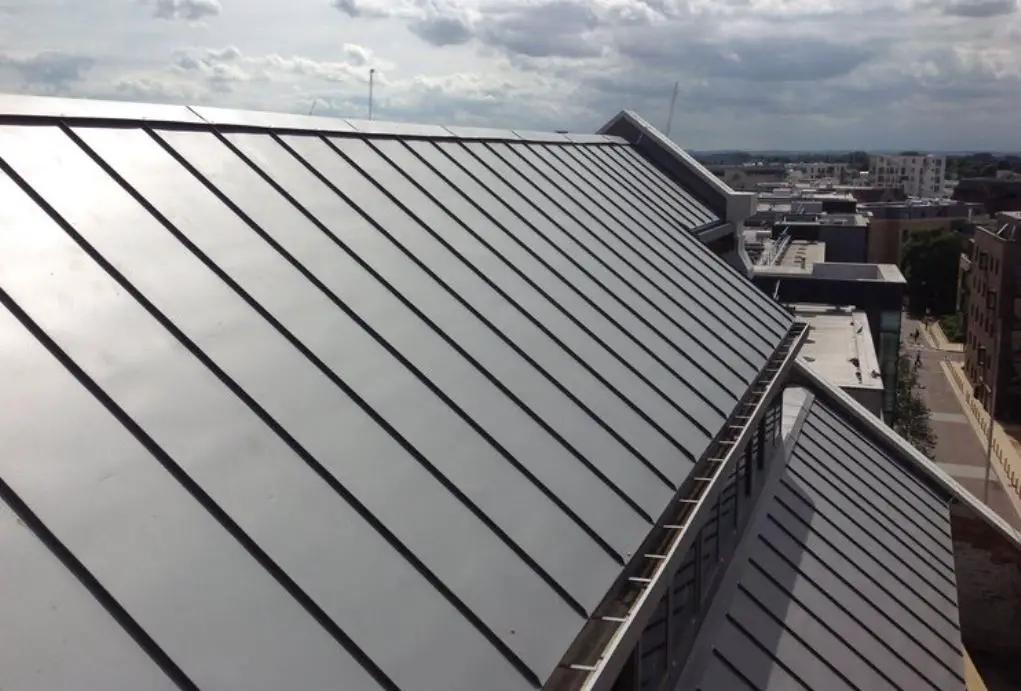
Weather-related issues
A properly installed zinc roof will fulfil its task of keeping the elements out of the house perfectly fine. That does not mean that a zinc roof is unaffected by the weather.
Referring back to the list of disadvantages above, you will notice that many of them are in fact weather related.
Zinc roofs can be awfully noisy in violent climates and they are not the sturdiest option available in areas with strong winds.
Again, many of these problems can be avoided or at least subdued by ensuring your roof is installed by a professional, but it is something you might want to keep in mind if your home is in an area with extreme weather conditions.
Installation
As we’ve pointed out, the most common problems associated with zinc roofing are caused by faulty installation.
Because it is an expensive roofing option, people often try to save money by hiring the cheapest contractors they can find or attempting to install the roof themselves.
Properly fitting a zinc roof is a difficult task though, and it would be best to consult a professional.
Unpredictable patination
We’ve touched on the unpredictable patination in the list of disadvantages already.
The problem with this is that it can be difficult to ensure that your roof is aesthetically balanced since it isn’t easy to control the patination process on zink roofing.
Once again, a knowledgeable contractor should be able to assist you with information about the patination tendencies in your specific climate and offer possible solutions as to how to circumnavigate the problem of uneven patination.
Comparing zinc roofing to some of its alternatives
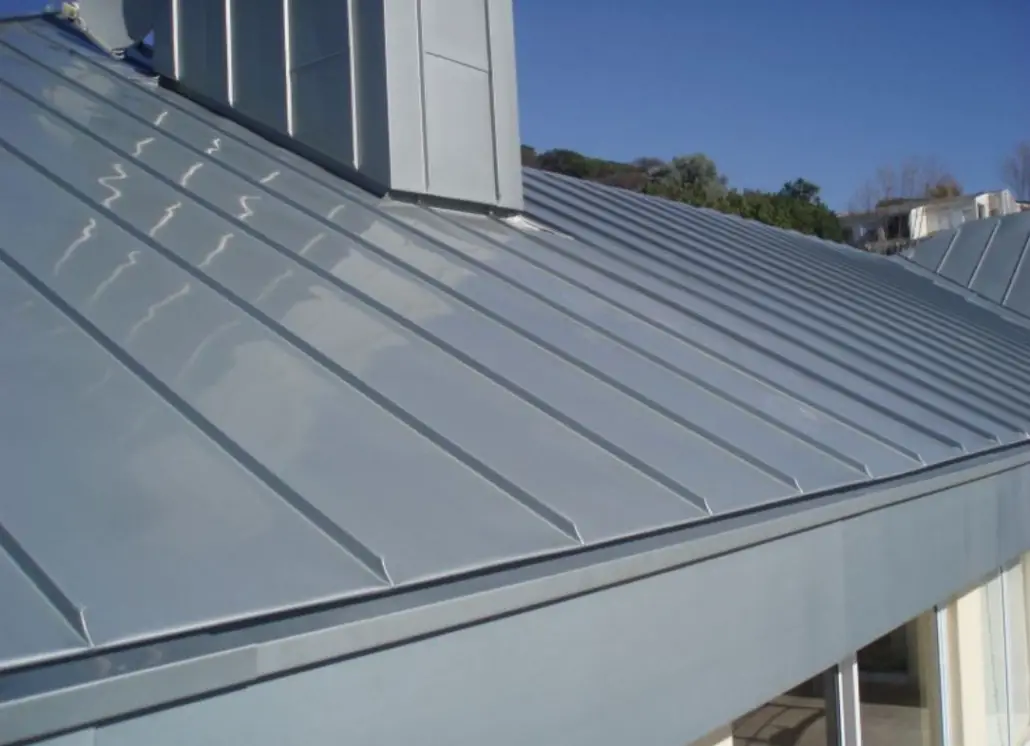
How do the pros and cons of zinc roofing compare to slate, tile, Colorbond and fibreglass alternatives? One isn’t necessarily better than another, ultimately your decision should be based on which option best suits your needs.
Zinc vs slate
Slate roofs are made up of natural slate tiles.
They are a beautiful alternative to zinc roofing, imagine the roofs of castles and villas, but there are a couple of other factors we also need to consider apart from its beauty.
Firstly, slate roofing can only be installed on structures that can support its weight. Secondly, slate roofing is one of the few alternatives which will actually cost you more than zinc roofing.
Even more than zinc roofing, a slate roof’s effectiveness is heavily dependant on the quality of the installation, it’s essential to get an expert to install your slate roof for you.
Finally, because slates are formed naturally there is no quality control or guarantee of the condition the slates are in, or how long they will last. That said, slate roofing is probably the most aesthetic option available.
Zinc vs tiles
Tile roofs resemble slate roofs in that they consist of carefully placed, overlapping pieces that covers the roof. The obvious difference being that tiles are manufactured in a variety of different materials.
Restore Masters give a comprehensive overview of different types of tile roofs in this article. Compared to zinc roofing, tiles are a cheaper option and they tend to be better at containing heat.
It is also easier to replace tiles than it is to repair a zinc roof. That said, zinc roofs are more malleable and easier to adjust to fit your design and houses with zinc roofing will be cooler in warm climates than ones with tiles.
Zinc vs Colorbond
Colorbond is a brand of steel manufactured specifically to meet building needs. Because Colorbond is designed to be used as building and roofing material, it is a very secure option. As such, Colorbond is better than zinc in every aspect, except that is more expensive.
Zinc vs fibreglass
Fibreglass is one of the newer options available. Fibreglass and zinc share a number of qualities, both are lightweight and both are easily adjusted to fit your design.
Zinc, however, has a much longer expected lifespan and is more fire resistant than fibreglass. The main advantage of fibreglass is that it can be manufactured in almost any shape or colour.
Advantages of zinc roofing
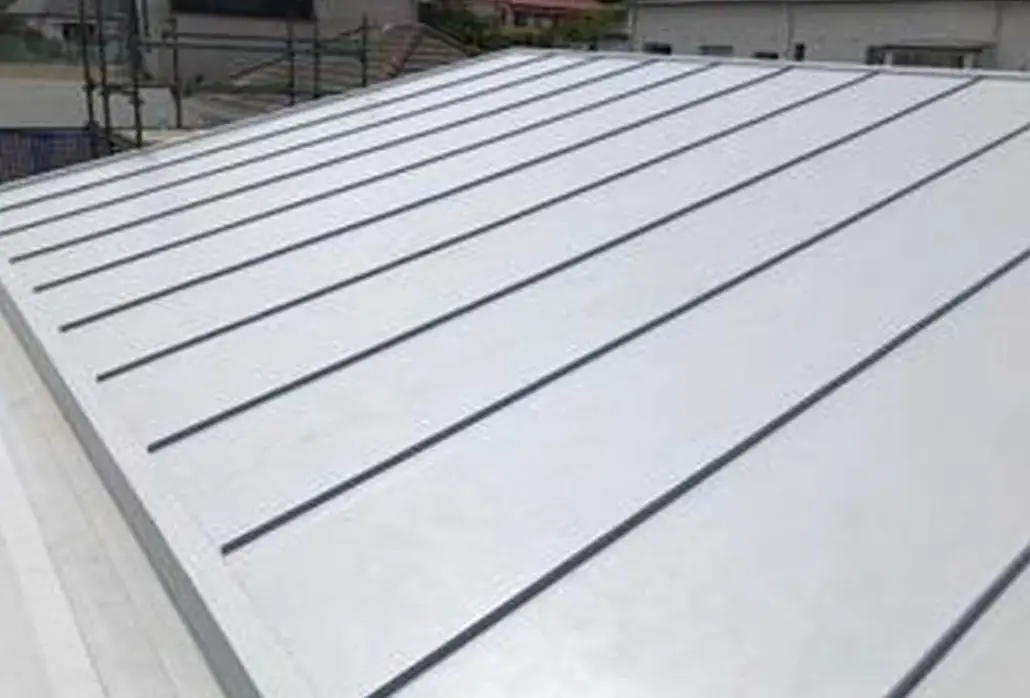
This article is meant to inform you about some of the difficulties and problems often associated with zinc roofing. Nevertheless, it is also important to remember zinc is such a popular option for roofing material.
Corrosion resistant
Zinc will withstand corrosion for hundreds of years. According to VMZinc, zinc typically corrodes at a rate of about 2 to 6 microns per year.
With the thinnest sheets of zinc being at least 700 microns thick, that means that a zinc roof will be able to withstand corrosion for at least a 100 years (other factors might reduce a zinc roof’s lifespan to about 60 years, which is still a long time).
Self healing
Zinc has amazing self healing properties which allow it to repair small scratches over time. This, paired with the protective layer caused by the patina process, means that zinc roofs require minimal maintenance.
Here’s a video explaining the phenomena of self healing metals in detail.
Malleable
Strips of zinc are highly malleable and can be adjusted to fit any design. This allows homeowners greater freedom to be creative when designing their houses.
Because of this malleability, zinc is often the preferred option for roofs with curves or odd shapes.
Recyclable
Zinc is a natural material which can be recycled indefinitely. This means that zinc is one of the greenest options of roofing materials available.
This is, as it should be, a factor that is growing in importance for homeowners and builders around the world.
Long lasting and low maintenance
Because of the characteristics of zinc roofing mentioned above, zinc roofs tend to survive for a very long time and require little maintenance.
Its self healing qualities and protective layer significantly reduces the amount of maintenance you will need to do on your roof. On top of that, because zinc roofs do not really corrode, they can easily last for generations.
FAQs
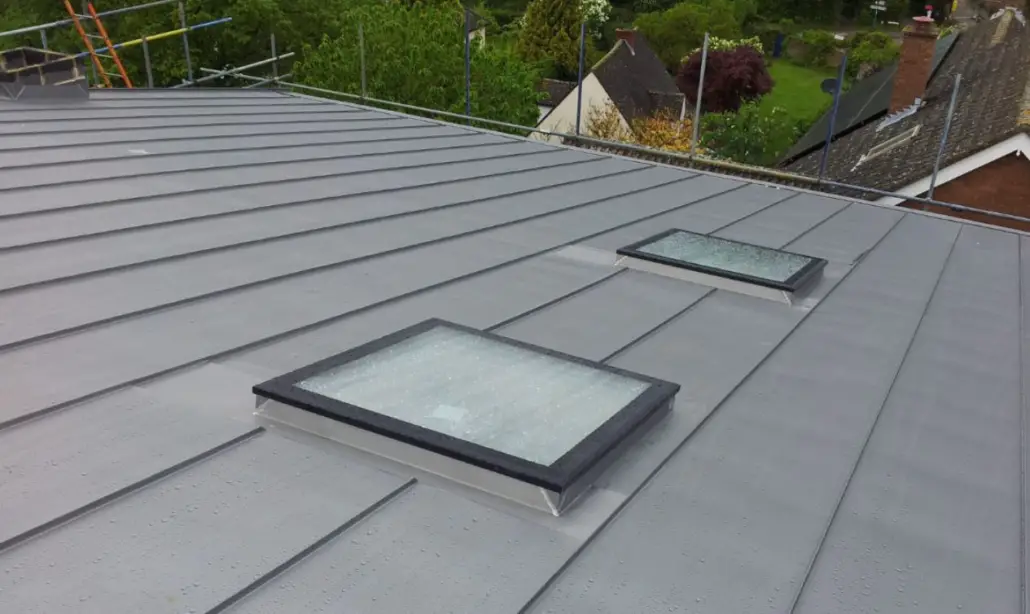
Q: How long do zinc roofs last?
If a zinc roof is designed well and installed properly, it will last for at least 60 years, but can easily survive for more than 100 years.
Q: Do zinc roofs rust?
If the patina protective layers forms over your zinc roof, it should not be susceptible to rust.
Q: What is the strongest material for a roof?
Galvanized steel, or purpose built materials like Colorbond, are the strongest materials available as roofing options.
Q: Are zinc roofs noisy?
Zinc roofs are known to have problems with being noisy. That said, there are very effective measures you can take to reduce the noise if you have a zinc roof.
Q: Can you walk on a zinc roof?
A well installed zinc roof should be able to hold your weight, but it’s best not to walk on the roof. If you, or a contractor, need to walk on the roof, it is best to stick to reinforced and supported areas.
Q: What goes under a zinc roof?
Zinc roofing are a viable option for most structures. You can put anything under a zinc roof.
Q: Does a zinc roof need ventilation?
Zinc roofing does not need ventilation. If your zinc roof is covering an area you live in, ventilation and insulation requirements will depend on your preference and needs.
Q: What color metal roof fades the least?
The darker the color of your roof, the more noticeable a gradual fade in the color will be. Lighter colors fade less. White and gray are good options if you are concerned over the colour of your roof fading.
Q: Will a metal roof attract lightning?
No, lightning is no likelier to strike a metal roof than any other material.
Q: Do metal roofs affect cell phone reception?
No, having a metal roof will not affect your cellular reception at all.
Q: What color metal roof is the coolest?
Zinc roofs are generally cooler than other materials already. Lighter colors that reflect light away from the house, like white, silver or beige will be the coolest.
Conclusion
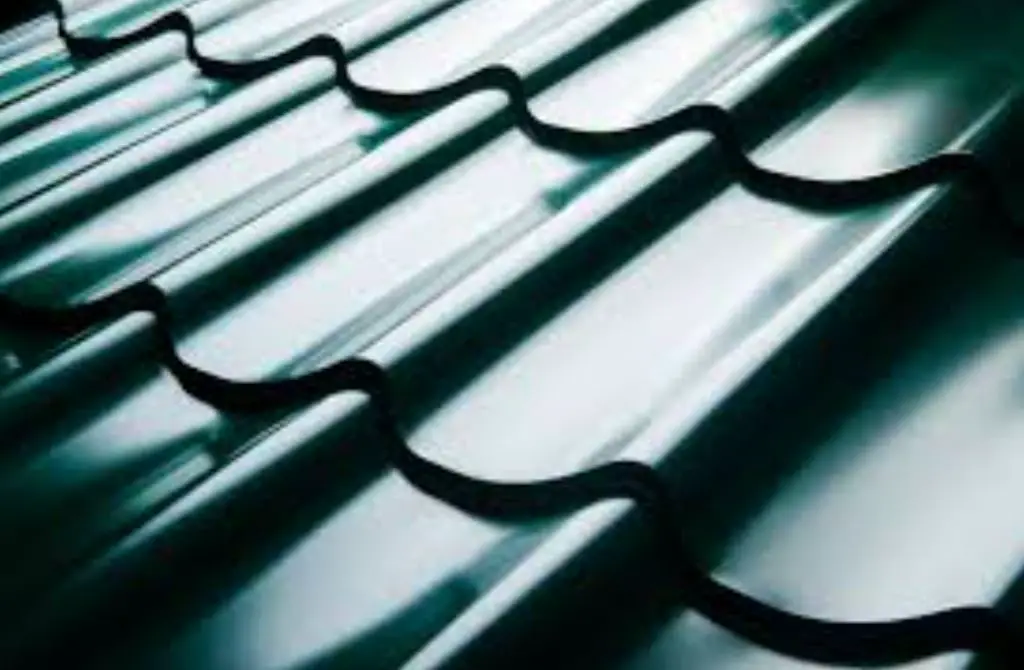
Hopefully this article has provided you with all the information you need to make an informed decision on which material you want to use for your roof.
Zinc roofing comes with a number of characteristics that many homeowners find desirable. Its malleability and durability sets it apart from many other options.
That said, it is important to be aware of some of the problems associated with zinc roofing. Installing a zinc roof requires specialized and often expensive help. It can be noisy, and you might not always get the patina on it that you want.
Now it is up to you to consider your unique circumstances and decide which factors are most important to you.


